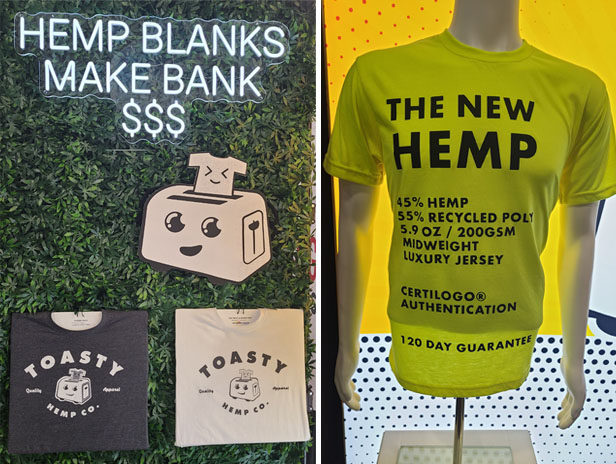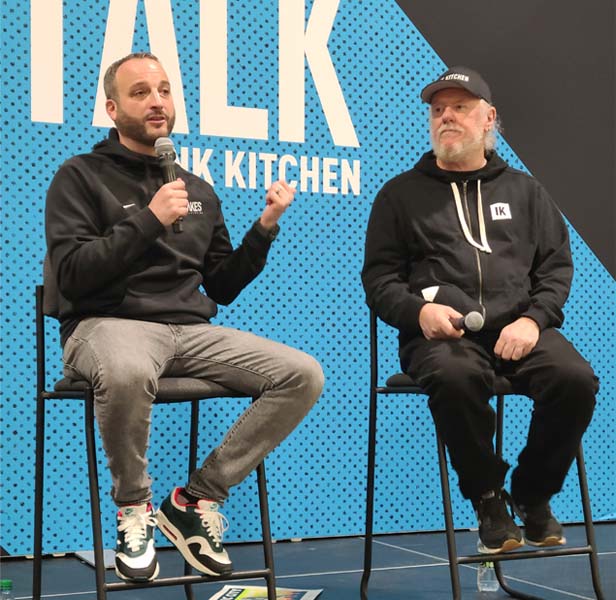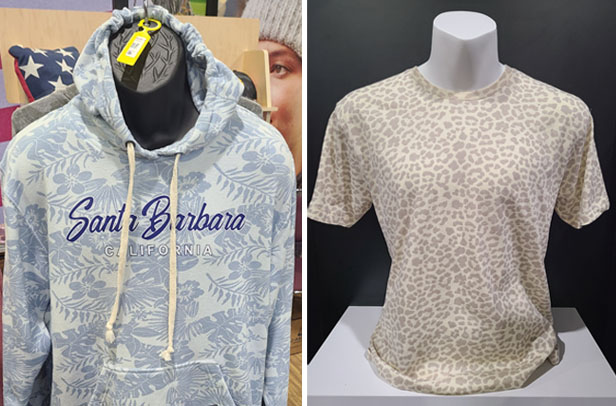Sustainability March 24, 2023
4 Takeaways From Impressions Expo Atlantic City
Sustainability and bold patterns abounded at the show.
This year’s Impressions Expo Atlantic City, held March 23 to 25 at the Atlantic City Convention Center, was packed with decorating equipment manufacturers, apparel suppliers and other companies with software, services and supplies for the printwear market. As has been the case at other industry trade shows this year, sustainability was top-of-mind for suppliers. Other noteworthy trends include the prevalence of animal prints and other bold patterns and special effects decoration methods, like 3-D puff heat transfers. Here’s a look at five major takeaways from the show.
1. Sustainability Is Here to Stay
Adam Walterscheid of Single PO Solutions talks about brand Fairweather Johnson and why sustainability is here to stay. #impressionsExpo pic.twitter.com/A9vvtOuG6W
— Theresa Hegel (@TheresaHegel) March 24, 2023
Several suppliers were touting their recycled apparel – whether it was outerwear made of polyester derived from discarded plastic bottles or a rainbow array of tees made from recycled cotton and poly.
Fairweather Johnson, a private label brand available through Single PO Solutions (asi/87456), offers apparel made from a mix of recycled cotton and recycled polyester. Leftover scraps of fabric from the cutting-room floor (post-industrial waste) and pre-worn clothing (post-consumer waste) are sorted by color and chopped into smaller pieces, which are then blended and processed to achieve the final color. That material is converted into fiber and spun into recycled yarn, with no need for dyeing or water consumption.
“Reclaimed manufacturing can reduce water consumption by 60 gallons per T-shirt and the carbon footprint impact by 45%” compared to conventional production methods, according to Fairweather Johnson’s catalog.
What makes the brand’s offerings especially noteworthy is the range of colors offered, which is more difficult to achieve without the use of any dyes, said Adam Walterscheid, CEO of Single PO. “We came up with a core collegiate color scheme that works for most schools and major companies,” he added.
Because of the nature of the closed loop production process, colors may vary from lot to lot, but the company notes that they’re within GRS certification tolerance.
Landway (asi/66238), a Hayward, CA-based supplier of outerwear and other apparel, noted that several of its most popular jacket styles would be switched over to recycled polyester later this year. “We’re coming out with a lot of new styles that are 100% recycled,” said John Hein of Landway.
The shift to more sustainable options is being driven by consumer demand, according to Walterscheid. He added: “It’s a trend that’s come and gone a few times, but this time the staying power seems to be there.”
Suppliers also emphasized that their sustainable options didn’t come at a premium. Brisco Brands, a T-shirt maker for major retailers, was debuting a line of sustainable ringspun tees for apparel decorators, made from 60% recycled post-industrial cotton and 40% polyester made from recycled plastic bottles. The shirts have price tags comparable to traditional tees, according to John Griffin of Brisco Brands.
“Doing the right thing shouldn’t cost your customers more money,” Griffin added.
2. Is It Hemp’s Time to Shine?

Toasty Hemp Co. showed off hemp tees with a traceable supply chain verified by Certilogo.
Ryan Zaczynski still remembers the first time he put on a hoodie made from hemp a few years ago. “I was wearing it on a cold October day, and I was actually warm,” he recalled. “I can never remember being this warm in a hoodie.”
That experience sparked his interest in the fiber and eventually led him and his wife to found Toasty Hemp Co. to bring hemp-derived blank apparel to the printwear market. “Hemp is an amazing material,” Zaczynski added. “It’s antimicrobial naturally, it’s four times stronger than cotton, it takes any sort of decorations just like a cotton tee would.”
Toasty Hemp also works with Certilogo to verify and trace its supply chain. Each tee includes a QR code that end-users can scan for information about how the garment was made.
Hemp, sometimes referred to as a “golden fiber,” has been growing in popularity as an apparel component thanks to a number of eco-friendly properties
3. Diversity & Inclusion Aren’t an Afterthought

Jed Seifert (left), owner of Stakes Manufacturing, talked with Rick Roth about the benefits of hiring people with disabilities.
Jed Seifert, co-founder of print-on-demand company Stakes Manufacturing in Eastlake, OH, talked about the many benefits of hiring employees with disabilities during a Shop Talk discussion hosted by Rick Roth of the Ink Kitchen blog.
Seifert says he was inspired by his own brother, who has Fragile X syndrome – a genetic condition that often leads to autism. Twenty years ago, Seifert said, his brother was hired in the mailroom of the Securities and Exchange Commission, “and it changed his life.” He was able to gain his independence and move into his own place, and his life had meaning and purpose, Seifert said.
Unfortunately, around 80% of people with disabilities are unemployed – a statistic Seifert is actively trying to change, both by his own hiring practices and by inspiring others in the industry to practice inclusive hiring.
“There’s an untapped workforce that’s ready to go to work,” Seifert said.
Stakes Manufacturing employs about 250 people, and around 10% have some kind of disability, including autism and cerebral palsy. Oftentimes, Seifert said, people with disabilities thrive in positions that have a repetitive nature, whether it’s folding and processing garments or data entry on computers.
“Let me be very, very clear here, we’re not talking about charity,” Seifert said. “We’re not talking about hiring people with disabilities for warm and fuzzies.”
Instead, it’s meaningful work that’s as beneficial to the company as it is to the employee. Seifert added that the top performer – based on key performance indicators – every month in his company’s warehouse last year was an individual with autism.
“When you have people that come with a positive attitude that are just so grateful to be there and work hard, it’s contagious,” he added. “Our other employees’ metrics got better. Our managers got better.”
For companies interested in giving people with disabilities a chance at employment, Seifert recommends seeking out disability employment organizations, like your local Arc chapter, to help with placement, training and other services a typical employment agency would provide.
4. Grab Attention With Patterns & Special Effects

Suppliers like J. America and LAT Apparel showed off garments with an array of trending patterns.
Patterns and quilted textures were everywhere on the show floor. J. America (asi/62977) showed off bold cheetah prints and more muted tonal florals. LAT Apparel (asi/65948) had a natural leopard print tee. The patterned shirt can easily be printed, without worrying about issues like dye migration, according to Dustin Moe of LAT.
Also of interest were special effect and multimedia decoration techniques. 3-D puff heat transfers were particularly hot. Jody Mazade of Howard Custom Transfers (asi/61921) noted that her company’s puff transfers could be combined with flat transfers to give a faux embroidered appliqué look or used on their own for a dimensional, retro vibe.
“People are going crazy for puff,” she added.

Promo for the Planet is your destination for the latest news, biggest trends and best ideas to help build a more sustainable and socially-responsible industry.
